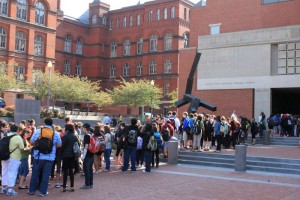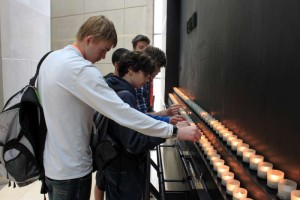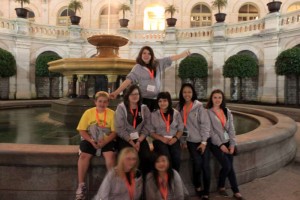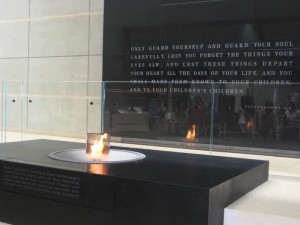For more information on the The Asper Foundation’s Human Rights and Holocaust Studies Program, please see Program at a Glance.
One of the major initiatives of The Asper Foundation is its Human Rights and Holocaust Studies Program. Through a specially designed education program, the program objectives are to educate grades seven to nine Canadian students about the Holocaust and:
- inspire them to take personal responsibility to combat antisemitism in particular and racism in general;
- show them the consequences of complacency and indifference;
- sensitize them to the consequences of racism; and
- promote respect for others
The Asper Foundation covers over 50% of the hard costs of the program.
This program, which started in 1997 in Winnipeg, Canada, is now a national initiative that is inclusive of students from many backgrounds. It is the recipient of the 2004 Human Rights Award from the Nova Scotia Human Rights Commission “in recognition of (its) creative means of advancing and protecting human rights and working to address racism in our communities” and The Asper Foundation received the 2008 New Brunswick Pioneer of Human Rights Award from the New Brunswick Human Rights Commission in recognition of “human rights pioneers for their historic contributions to the protection and promotion of human rights in Canada.”
The Asper Foundation and its program partners contribute and raise over one million dollars annually to facilitate the participation of students and their chaperones in the program.
In 2000, for the first time, this program became a national initiative. All students are required to take an 11-hour education program, or its equivalent, on human rights and the Holocaust with an added emphasis on Canadian history and the current situation in the world today. The curriculum for the educational component of the program was developed specifically by Holocaust and human rights educators for The Asper Foundation. Until 2015, after the educational component was completed, students participated in a trip to Washington, DC, where they spent several days at the U.S. Holocaust Memorial Museum and other important monuments relating to freedom. In 2016, The Asper Foundation Human Rights and Holocaust Studies Program shifted its trips from Washington, DC, to Winnipeg, MB and the Canadian Museum for Human Rights. The program is open to schools and organizations across Canada outside of a 2-hour drive radius from Winnipeg, MB.
The students are also required to volunteer for five hours in their communities on public projects that meet program requirements which has resulted in over 154,000 hours of community service being carried out across Canada since the program was established.
The last component of the program is a voluntary evening graduation ceremony held to present a Memorandum for Personal Responsibility to each student. This document was commissioned by The Asper Foundation specifically for this program and written by Dr. Israel Asper. The Memorandum aims to provide each student with a sense of the importance that they participated in the program and to remind them that they have a personal responsibility for the world community. The ceremony is a wonderful way to provide the students with closure to the formal part of the program as well as the sense that they are now beginning a new life of greater understanding and inclusion.
Past student program participants have remarked “I will remember the trip for my whole life. It gave me a different view of the world”, “As I speak to people now, I realize the true meaning and importance of bearing witness”, “You have no idea how much this experience meant to us all” and “By being educated about these tragic events in history, people will be more motivated to stop what is happening now.”
The value of this program is reflected in the support it receives across the country by private and public foundations, organizations and individuals who understand its importance. Another measure of the program’s value is the fact that in Washington, DC, for several years, Congressman Tom Lantos (1928-2008), the only Holocaust survivor elected to the U.S. Congress, met with and spoke to program participants about the importance of understanding and protecting human rights. Congressman Lantos described the program as “outstanding.”
A significant portion of the costs of the program are borne by The Asper Foundation. Since the program’s inception in 1997 to 2019, over 14,000 students and chaperones in 205 cities spanning twelve provinces and territories across Canada will have participated in this initiative.
In April 2003, Friends of the Canadian Museum for Human Rights in joint partnership with the Government of Canada, Province of Manitoba, City of Winnipeg and the Forks North Portage Partnership announced the intent to establish the Canadian Museum for Human Rights in Winnipeg. The concept for the museum was inspired and motivated by the extraordinary impact of The Asper Foundation Human Rights and Holocaust Studies Program. The Museum was later established as a national Museum in March 2008 with construction beginning in spring 2009 and opened September 20, 2014. The Canadian Museum for Human Rights explores the subject of human rights and its purpose is to promote understanding, respect and to encourage reflection, dialogue and action.
The Canadian Museum for Human Rights is the first national Museum created in Canada since 1967 and the first national Museum to be located outside the National Capital Area. The Asper Foundation Human Rights and Holocaust Studies Program will evolve and be expanded in the coming years to integrate the experience of this exciting, new national museum. Friends of the Canadian Museum for Human Rights envisions a national student program with the resources to sponsor tens of thousands of students and their chaperones from across Canada to visit the museum each year.












